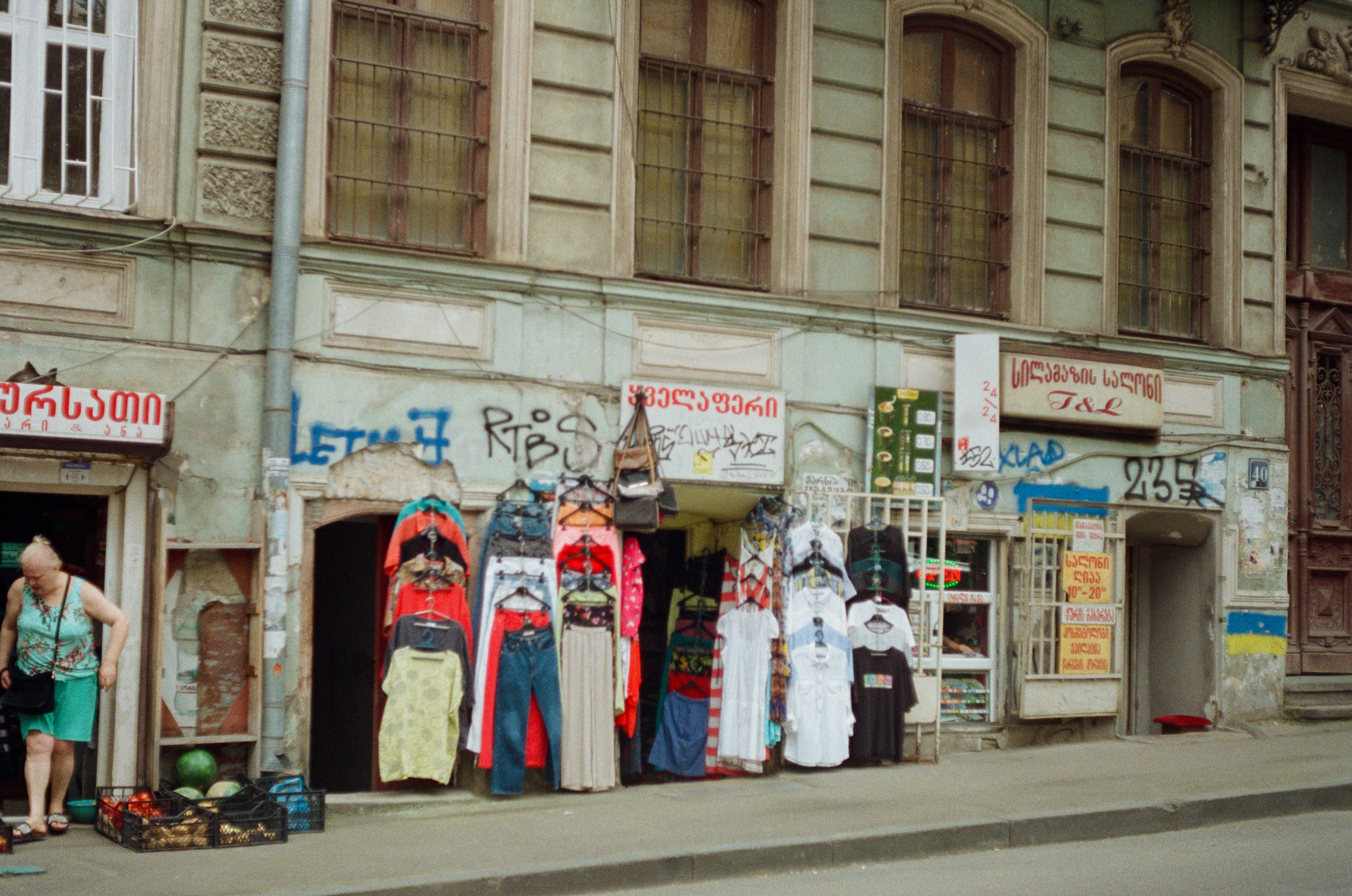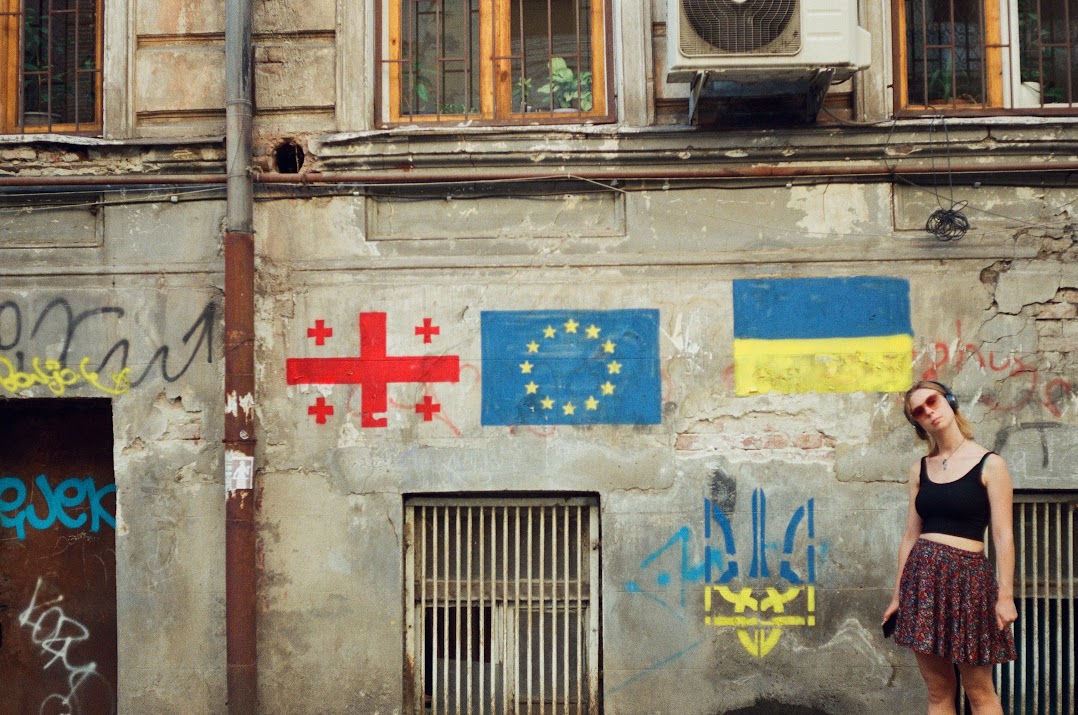Tbilisi, 2023
Lucie Eleanor
Rosa describes Tbilisi, with its narrow, winding streets, like a complex, moving staircase. You will think you have noticed everything, but then you take a wrong turn and find yourself in a shaded courtyard, air thick with blossom, or a little park, watched by a whole family of cats, or a quiet, fragrant bookshop that feels a little like intruding on a holy space. At lunchtimes we sit on a bench in a quiet spot next to an Orthodox church, its walls pale yellow against a sky so blue it is almost painful, and eat our favourite, nigvziani badrijani - thinly sliced, fried aubergines, stuffed with walnut and garlic paste and studded with pomegranate seeds. Dogs curl up like commas on sunlit corners and sometimes, when you walk past a friendly one, he will perk his ears up and start politely trotting after you.
After dark, the cicadas bristle and purr, and the pavements and buildings are lit dark gold under orange streetlamps. Neon-lit cafés and co-working spaces stay open late into the evening, tendrils of incense unspooling in each corner, mostly empty of customers. At the cafe further down our road, Dzmebi Zubalashvilebi Street, you can order a single rolled cigarette to come with your coffee, which seems like a flirty and fun idea until we realise it’s deeply embarrassing to watch the barista, who looks not long past eighteen, roll it for you. Cats curl their bodies into windowsills and porches; they are thinner than the cats I am used to seeing, and their visible spines and large, startlingly yellow eyes make them seem formidable, somehow, like tiny leopards.
*
Rosa takes me to a feminist music and art festival at a vegan anarchist bar whose location you can only find through joining their Telegram channel. We sit on the balcony and people-watch, sharing two or three Marlboro Reds, passing them between our lips like a deconstructed kiss. It’s mostly young Russians there, sipping beers, petting the street dogs when they wander through, intricate tattoos skirting their hairlines. I bathe in the hum of unfamiliar voices. Rosa chats in Russian to a few people and introduces me as hers, and I am content to be silent and described. It is often like this, with me. I will stumble into a scene, dragged in by the arm by someone bolder, louder, and tuck myself into other people’s conversations and friendships for the evening.
Venues like this one are fairly new to the city. After Putin’s invasion of Ukraine in February 2022, anti-war Russians began to leave the country in droves, often to Tbilisi, Istanbul, or Yerevan. The introduction of conscription later that year sparked another wave of immigration, with 222,274 people travelling from Russia to Georgia that month alone. They did not receive a warm welcome, however, for understandable reasons; Russia invaded Georgia as recently as 2008. The regions of Abhazia and South Ossetia are under Russian occupation, and about six percent of Georgia’s population are internally displaced. Stickers on lampposts throughout the city constantly remind us that 20% of Georgia is still occupied. It seems like in every other flat, a Ukrainian flag hangs from the window, and on every street, you will see graffiti telling Russians to go home, declaring Russia a terrorist state.
To Georgians, thousands and thousands more Russians in Georgia feels like an encroachment – no matter the views of the Russians in question, or how unsafe they might be back home. And their arrival has made a material difference; Russian salaries tend to be higher than those in Georgia, so rents have skyrocketed in central Tbilisi. In the centre, you might hear more Russian than Georgian on the street. Cafes and bars like this one are a symptom of this gentrification; their prices are high, their menus often entirely vegan.
Everyone we speak to at the festival has a story. Conversations start with where are you from? and where are you going? – almost nobody’s plan is to stay in Tbilisi forever. Russians don’t need a visa to live and work here, so Tbilisi feels like a waiting room for people while they find one for somewhere else and firm up more permanent plans. As I write this, less than two years on, many of them will already have left. At the bar, we meet a couple who got married that morning, the woman in a simple white cotton sundress, her husband in an oversized floral shirt. When I ask what their plans are now, he says, “Get wasted”, and grins. Two Georgian teenage boys in oversized Saburtalo football shirts tell us they come to the bar almost every night for the music, and they’re playing their first gig there very soon. They want to invent a new genre of music, called Dread, because that’s what living in Georgia today feels like to them, they tell us - dreadful.
We meet an American guy in his forties, who looms too close to us, unsteady on his feet, and monologues about his lost love, a British woman who, he said, was a radical animal activist, and would stand in the way of men on horses, blocking them from their fox-hunts. “She was so fearless,” he says, wistful. An artist from Moscow tells us he is planning to move to Australia with his wife, laughs for several minutes at Rosa’s attempt at an Australian accent, lets us add our own coloured pen sketches to a vast, collective canvas.
On our way back from the festival the clouds bloat purple with warm rain. I’ve never been in a storm like it before; each raindrop feels big enough to fill my whole mouth. Soon enough the steep winding streets leading to Rosa’s flat become rivers, and the puddles are deep enough that brown water pours over the rim of my boots. We get home, shower the rain off, and I throw the window open, perch on the window seat and watch the storm end, the thick grey fading to violet, bats shuddering into view, swifts diving and looping above. There is a nest in a hole in the brickwork of Rosa’s building, and sometimes we hear the baby birds rustle and cry, the flurry of relief as their mother returns with food. The sweet, rain-soaked air settles into the bottom of my lungs, like mist.
*
One morning in February, Rosa takes me to Nutsubidze Plato I and the famous Skybridge between apartment blocks. We take the Metro all the way to the end of the Saburtalo line, and when we come back above ground, away from the warm grey breath of the platform, the chill makes me wince. I am in a thin dress and a cardigan and it is far too cold for either. The wind is tugging tears from my eyes, rendering my makeup an incoherent watercolour.
From the bridge, the city sprawls out below us: concrete lit up warm by winter sun, broad cedars clinging to the hillsides, snow-freckled blue and gold mountains in the distance. At every other window laundry flutters dry in the wind. It is quiet - the only others there are presumably the building’s residents, leaving for the day or coming home with shopping bags.
The three apartment blocks - Micro I, II and III - were built in the 70s, and sit upon the side of a steep hill, connected by a bridge that runs through all three. When they were designed by architects Kalandarishvili and Potskhisvili, the idea was that they would be the first of many more blocks like them, but in the end the others never came to be. Their design references traditional Georgian architecture; Micro III’s wooden facade nods to the intricate carved wooden balconies of Tbilisi’s Old Town, and on a few sides there are arrowslits in the shape of crosses.
Many Georgians consider blocks like this an eyesore, a hulking souvenir from decades of Soviet occupation. But later, a quick Google informs me there are now specific tours dedicated to Tbilisi’s brutalist architecture, catered mainly to tourists from the US or Western Europe, who might have seen buildings like them romanticised on TikTok. I am photographing these buildings because they are remarkable to me, because I do not live in one or experience it as part of my daily life. The very act of conceptualising an interesting shot betrays a privilege, purely in my thinking it is interesting. And acknowledging this does not absolve us, either. We are still two British girls, taking photos of somebody else’s house.
*
June arrives, and with it my final visit. Lisi Lake lies just beyond the high-rises of Saburtalo; a few minutes’ drive further, and we are suddenly among clear air, mountain ridges, what Rebecca Solnit calls the blue of distance. Rosa is keen to swim, leaving me sat on a towel on the stony beach with a book I’m not especially loving, so instead I devote myself to noticing. The mosquito bites on the insides of my legs have ripened, and the itch fizzes. Small, foamy waves lick uncertain at the pebbled shore; a warm wind streams from across the water and pours over us, unceasing.
Children shriek and belly-flop in the clear shallows, watched by their mothers, who stretch out on white plastic loungers, and the occasional heron, unblinking and deathly still. Two dogs have slumped themselves underneath a tree, stirring only to bite lazily at air or pad over to the Dunkin Donuts stand for scraps. A tiny lizard perches on a rock a metre or so away from me, speckled and glistening. We make brief, knowing eye contact, and he darts away.





